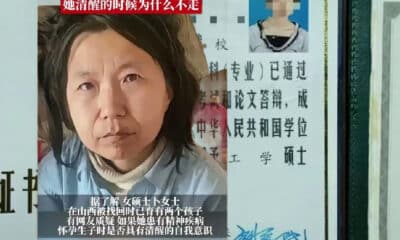Newsletter
Weibo Watch: Buddha’s Happiness and a Storm in a Latte Cup
Why was HeyTea’s Buddha brew discontinued? How to explain the major drama surrounding e-commerce influencer Dong Yuhui? Which other topics went viral on Weibo? We discuss al the ins & outs in this 20th edition of Weibo Watch.
Published
1 year agoon
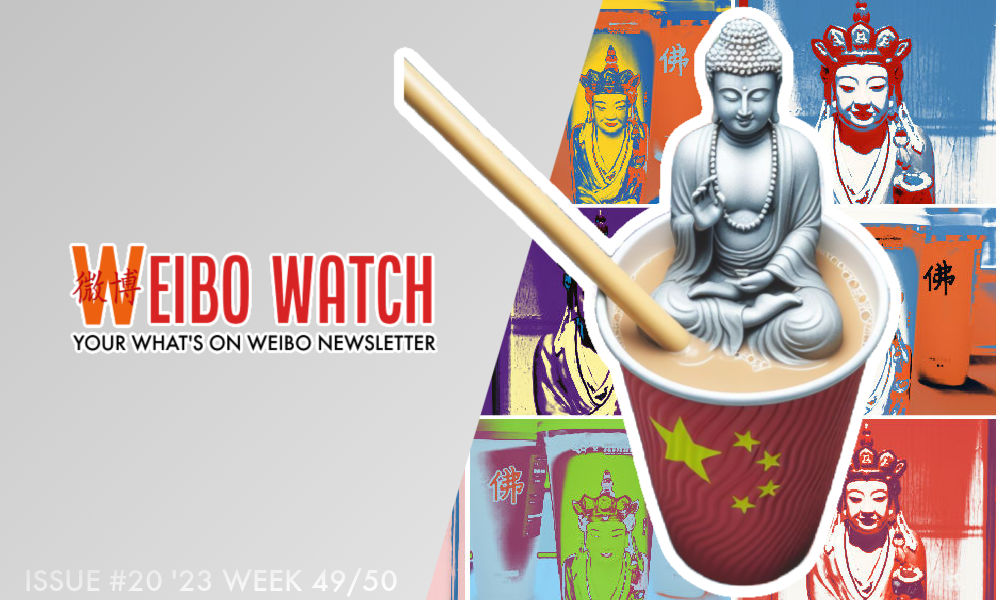
PREMIUM NEWSLETTER | ISSUE #20
This week’s newsletter:
◼︎ 1. Editor’s Note – Blessed objects
◼︎ 2. What’s Featured – A closer look at the featured stories
◼︎ 3. What More to Know – Highlighting 8 hot topics
◼︎ 4. What Lies Behind – Behind the Dong Yuhui drama
◼︎ 5. What’s Noteworthy – Zhang Xuefeng and liberal arts
◼︎ 6. What’s Popular – MayDay alleged lipsync incident
◼︎ 7. What’s Memorable – More attention for Nanjing Massacre
◼︎ 8. Weibo Word of the Week – “Rat-like Handsome Guy”
Dear Reader,
What was supposed to be a “zen” cup of tea caused a stir in China earlier this month – a storm in a latte cup.
The well-known Chinese tea chain HeyTea (喜茶), comparable to a tea-centric Starbucks, collaborated with the Jingdezhen Ceramics Museum to release a special ‘Buddha’s Happiness’ (佛喜) latte tea series adorned with Buddha images on the cups, along with other merchandise such as stickers and magnets. The series featured three customized “Buddha’s Happiness” cups modeled on the “Speechless Bodhisattva” (无语菩萨).
The “Speechless Bodhisattva,” originally named the “Contemplative Arhat” (沉思罗汉), is a small statue from the Jingdezhen Ceramics Museum that already became the ‘museum viral hit’ of the October holiday this year due to its facial expression. Videos that went viral on Weibo showed crowds of people in front of the statue, trying to get a glimpse of its expression – not unlike the crowds in front of Mona Lisa.
In light of this popularity, it is not surprising that the special Buddha HeyTea x Jingdezhen collaboration soon gained popularity, especially among younger consumers. On the first day of the launch in late November, people lined up and the cups soon sold out in HeyTea stores across Chinese cities.
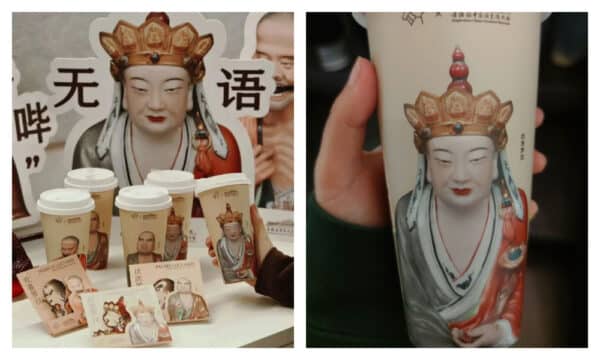
The HeyTea Buddha latte series, including merchandise, was pulled from shelves just three days after its launch.
However, the ‘Buddha’s Happiness’ success came to an abrupt halt when the Ethnic and Religious Affairs Bureau of Shenzhen (深圳市民族宗教事务局) intervened, citing regulations that prohibit commercial promotion of religion. HeyTea wasted no time challenging the objections made by the Bureau and promptly removed the tea series and all related merchandise from its stores, just three days after its initial launch.
The decision not only disappointed many but also sparked questions about the extent to which the HeyTea Buddha series genuinely conflicts with Chinese law.
As the issue became a topic of discussion, scrutiny arose regarding why other ‘made-in-China’ products, including Buddha keychains and Boddhisatva phone covers, are still allowed to be sold in the country. The popular WeChat blogging account Xinwenge also highlighted that, technically, the images weren’t even of Buddha but sculptures representing Arhats – Buddhist adepts or the highest ideal of a disciple of the Buddha. Moreover, the Jingdezhen Museum itself contributed significantly to the virality of the Speechless Boddhisatva; they even issued a special WeChat sticker series.
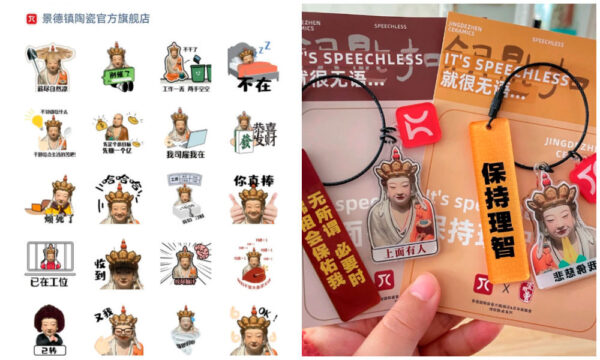
WeChat stickers (left), keychains of the Speechless Boddhisatva.
Some Chinese internet users, however, agreed that it was inappropriate for HeyTea to sell such ‘Buddha’ teas. Although they praised efforts to spread more love for Buddhism, especially among young people, they thought it was “extremely disrespectful” to have a Buddhist image on a tea cup that would end up in the trash.
For others, the discontinued milk tea cups became even more ‘sacred’ as they used them to make their own little office altars or lights.
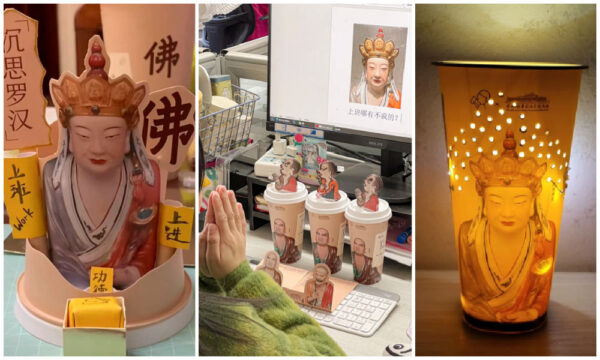
From office altars to holy lights, the HeyTea cups are transformed to spiritual objects.
The HeyTea Buddha latte tea saga provides insights into various facets of present-day China. It shines a light on the success of domestic coffee and tea chains and the original collaborations they launch to attract more customers. A recent academic study into the success and appeal of Chinese (bubble) tea brands even calls the long queues in front of these shops a “ritualised leisure experience” (Yan et al. 2023).
As we’ve seen in the past, whether it’s a new shop opening or the launch of a fresh collaboration, these events can quickly escalate from garnering local attention to becoming nationwide phenomena, with social media playing a pivotal role. Displaying your HeyTea cup holds a certain status, acting as social currency across Chinese social media platforms (Hutchins 2023, Ch5).
The story also underscores just how careful brands need to be when launching the next original idea; it cannot be too tame or else it won’t speak to China’s young consumers, but it also cannot be too bold or else it might rub Chinese authorities the wrong way.
Furthermore, the HeyTea story shows the interaction between Buddhism, consumerism, and the Chinese state. Nowadays, commodification of Buddha is everywhere, also in Tibet – even though it goes against traditions. Although the use of Buddhist images to sell merchandise unrelated to Buddhism could be seen as a form of “cultural misappropriation” (Cantanese 2019, 2), the commercial success of such products show that most people do not only see nothing wrong with it, they actually appreciate when their cup of latte has another layer of meaning to it: just because it’s commercial doesn’t mean it is meaningless.
As reported by Jing Daily earlier this year, Chinese temple visits have seen a significant surge and about 50 percent of Chinese temple visitors are millennials or were from Gen Z. Aside from burning incense and praying, these younger visitors are particularly fond of the temple shops that sell “blessed objects.”
Especially in a time when younger consumers are turning away from meaningless spending and are feeling more connected to spirituality, finding a bit of Buddha in their latte brings joy. “It’s a pity they discontinued,” one Xiaohongshu user wrote, “At least I still have the Buddha magnet on my fridge.”
To explore other viral topics on Chinese social media, check out our latest stories below. This week’s newsletter includes contributions from Miranda Barnes. You’ll hear back from us in our next newsletter, which you will get right before the start of 2024.
In the meantime, wishing you a merry Christmas, with lots of love, and perhaps some ‘blessed objects’ below the Christmas tree.
Best,
Manya
References:
Cantanese, Alex John. 2019. Buddha in the Marketplace: The Commodification of Buddhist Objects in Tibet. University of Virginia Press.
Hutchins, Joanna. Chinafy: Why China is Leading the West in Innovation and How the Rest of the World Can Catch Up. Singapore: Marshall Cavendish Business.
Yan, Qi, Xiaolei Shen & Haobin Ben Ye. 2023. “The Cue Is in the Queue, Smart! Assessing the Ritualised Leisure Experiences of Long Queuing for a Bubble Tea Brand in China.” Leisure Studies.
What’s Trending

1: Blood Donations in Tibet Trigger Controversy | The medical rescue of a critically injured Shanghai woman in Tibet has recently triggered major controversy on Chinese social media after netizens suspected that the woman’s treatment may have been facilitated through the abuse of power. Dozens of local public officials in Tibet donated blood to rescue a Shanghainese woman. Many believe it’s a matter of privilege.

2: Death after Binge Drinking | A woman who spent a night binge drinking with friends ended up experiencing cardiac arrest due to alcohol poisoning. A Chinese court has determined that her friends share partial responsibility for failing to prevent her from excessive drinking.

3: Doubts over Lucky Winner | A Chinese hardcore lottery player defied all mathematical logic last week by winning over USD 30 million by purchasing a staggering 50,000 tickets with the same number. The fortunate resident of Nanchang in Jiangxi province invested a total of 100,000 RMB (approximately USD 14,000) to buy tickets for the Chinese ‘Happy 8’ (快乐8) lottery, visiting multiple sales outlets. Since all the tickets shared identical numbers, each ticket yielded a prize and instantly made the man a multimillionaire. However, on Chinese social media, where the story went trending, people are skeptical and suspect foul play.
What More to Know
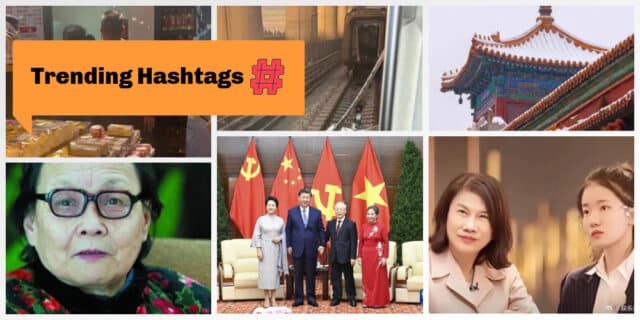
◼︎ Kathy Chow Hoi-mei’s Death and Leaked Medical Records | The death of the 57-year-old renowned Hong Kong actress Kathy Chow Hoi-mei (Zhou Haimei, 周海媚), who became famous for her role in various TV series in the ‘80s and ‘90s, became a major topic on Weibo this week. The actress, who had been suffering from autoimmune disease lupus for many years, still posted a happy video days before she passed, thanking people for the birthday wishes she received earlier this month. On December 11, rumors of her death started circulating and on Tuesday evening, a medical record believed to be related to Chow’s emergency treatment prior to her death surfaced and detailed the related medical rescue information. Kathy Chow’s studio later released an official statement confirming the news of her passing. A hospital worker from Beijing was later detained for leaking private, medical information (Weibo hashtag Zhou Haimei Passes Away #周海媚去世#, 1.5 billion views).
◼︎ Gree’s Dirty Laundry | Dong Mingzhu (董明珠, 1954), the famous Chinese businesswoman who serves as president of Gree Electric, the major home appliance maker known for its air conditioners, became a trending topic this week for lashing out against Meng Yutong (孟羽童, 1998) during her talk at at a ceremony for new employees on December 13. The 25-year-old Meng Yutong was previously a secretary for Dong, but left the company in May of 2023, saying she was pursuing postgraduate studies. Before joining Gree, Meng was working on a career as an online influencer and participated in various (reality) TV shows. She joined Gree in 2021. In her public talk, Dong Mingzhu criticized Meng by suggesting she used her position at Gree to become an online celebrity and that she had created “a negative impact” within the company. Many netizens think that Dong’s criticism actually has more to do with generational differences, saying Dong expected Meng to follow a similar path as her – but times have changed (Weibo hashtag “Dong Mingzhu Lashes Out Against Meng Yutong” #董明珠怒斥孟羽童#, 450 million views).
◼︎ Beijing Subway Carriages Break Apart | On the night of December 14, a train accident occured on the Beijing Changping subway line (昌平线). Over thirty passengers sustained injuries after one of the carriages broke apart in the middle; there was an abrupt break in the articulated joint of carriages 0244 and 0245. Passengers reported a “sudden impact” at around 19:00 as the train was on its way from Xi’erqi (西二旗 ) to Life Science Park (生命科学园站). The incident caused passengers to be stuck for a large part of the evening before rescue and evacuation teams arrived at the scene. The incident caused significant disruption for commuters, as they could not get their train back while hundreds of people were waiting for a taxi. The cause of the incident is still under investigation. (Weibo Hashtag “Beijing Subway Changping Line Experiences Sudden Malfunction” #北京地铁昌平线突发故障#, 290 million views).
◼︎ 86 Years Since Nanjing Massacre | The “Nanjing Datusha,” literally: “Nanjing Massacre,” was commemorated in China this week, both online and offline. The commemoration took place on December 12, marking the Japanese invasion of the city of Nanjing in 1937, starting a six-week long massacre during which people were bombed out of their homes and shot in the streets. Japanese soldiers tortured, raped, and killed large numbers of common people; their corpses were piled up along the river. According to China’s official data, at least 300,000 people, including children, elderly and women, were killed during this winter. Over recent years, Chinese social media has played an increasingly important role in the commemoration of the Nanjing Massacre. Although Chinese official media play a pivotal role shaping the way this is remembered online, ordinary netizens also show a lot of interest for this part of war history that is engraved in China’s collective memory. (Weibo hashtag “These Numbers Are Scars in Hearts of Chinese That Can’t Be Healed” #这些数字是中国人心里无法愈合的伤疤#, 170 million views).
◼︎ Gao Yaojie Passes Away | The Chinese renowned gynecologist, academic, and AIDS activist Gao Yaojie (高耀潔) passed away at the age of 95 this week. Gao achieved international acclaim as a ‘whistleblower’ for exposing an AIDS epidemic that spread across rural China due to irregular and illegal blood donation processes during the 1990s. She was actively involved in the fight against HIV/AIDS, but was also silenced and put under house arrest by authorities. She eventually fled to the US, where she stayed until her death. Although Gao’s passing went trending on Chinese social media, the narratives surrounding her death are very different from those in foreign media; one of the most popular posts on Weibo asserted that Gao’s pessimism about the Party and China’s future was “completely wrong.” Another popular post claimed that her work had become used as an anti-Chinese tool for “hostile Western forces.” (Weibo hashtag “Dr. Gao Yaojie Passed Away” #高耀洁医生去世#, 180 million views).
◼︎ Beijing’s First Snow | The Forbidden City dressed in white, Beijing Zoo pandas playing in the snow, and a winter wonderland at Summer Palace; this week Chinese netizens and online media accounts posted numerous photos of the first snow falling the Chinese capital. Although many enjoyed the snowfall, it also caused disruptions from airports to train tracks and from schools to offices. As temperatures keep plummeting, more snowfall is expected along with potentially record low temperatures. (Weibo hashtag: Beijing’s Snow #北京的雪#, 99 million views).
◼︎ Xi in Vietnam | Xi Jinping’s first state visit to Vietnam in six years made headlines this week. This visit, aiming to strengthen ties between the communist-run nations, follows Hanoi’s recent efforts to enhance diplomatic relations with Washington after a recent visit by Biden. During a summit in Hanoi, Xi and Vietnamese leader Trong advocated for strengthening strategic ties and agreed to collaborate on various issues, including maritime patrols, trade, and crime prevention. China is Vietnam’s largest trading partner, with significant economic and investment ties between the two countries. (Weibo hashtag: Xi Jinping’s Vietnam Visit #习近平访问越南#, 38+ million views)
◼︎ Toddler’s Tragic Death | A very tragic story coming from the city of Dongguan, Guangdong, attracted the public’s attention this week: a 2-year-old child fell into a supermarket bread/flour mixing machine on Decemer 8 and did not survive. The parents are the owners of the supermarket bakery, who would take their child to work due to lack of childcare at home. The incident has generated online discussions on the importance of parents providing a safe environment for their children (Weibo Hashtag “Dongguan Child Dies after Falling into Supermarket Bread Blender” #东莞一儿童掉进超市面包搅拌机身亡#, 290 million views; “The Child Who Fell in the Breadmaking Machine is Son of Owner” #掉进搅拌机的是面包店老板家孩子#, 15.2 million views).
What Lies Behind
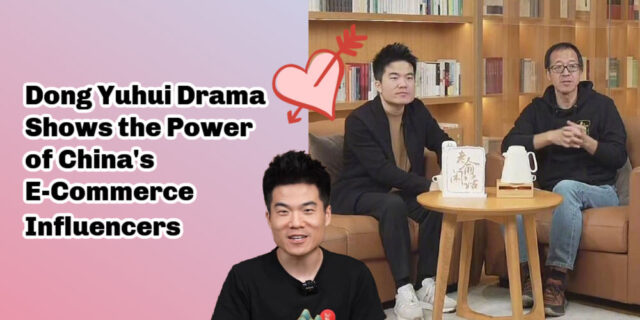
Behind the Influencer Drama at East Buy
In recent days, Dong Yuhui (董宇辉) has become a hot topic on Chinese social media after a live broadcast that captured widespread attention. Dong is a top livestreamer for the e-commerce platform East Buy (东方甄选), which is part of New Oriental (新东方). Formerly a celebrated teacher, Dong has garnered popularity among Chinese netizens for his enthusiasm, humble background, English proficiency, witty jokes, personal stories, honest talks, and singing talent (read more here).
The current buzz around Dong stems from ongoing drama at East Buy. Livestream viewers and Dong’s loyal fans were angered when the editorial team behind Dong claimed that many of his popular livestream talks and stories were not created by him alone but were the result of collaborative teamwork. This led people to believe that the company team was taking credit for Dong’s individual efforts.
This influencer drama, while not the first this year, stands out because fans are vehemently defending Dong. His followers even refer to him as the ‘National Son-in-Law.’ Many view the team’s comments as a form of betrayal and backstabbing.
The story has gained significant traction because people see themselves in Dong—a former farmer’s son who rose to China’s e-commerce stardom due to his talent and hard work. For many, he represents hope for ordinary people, a path they can dream of themselves. Now, facing workplace bullying, Dong’s fans are not just expressing support online; they are also redirecting their spending elsewhere, saying, “I only bought from them because I like Dong.”
Faced with an online boycott, a loss of millions of followers, and a drop in stock market prices, subsequent PR efforts to silence the issue went awry. In the end, the CEO of EasyBuy was removed, and New Oriental founder and chairman Yu Minhong (俞敏洪) stepped in to try to alleviate the marketing disaster by hosting a live stream jointly with Dong.
Online discussions continue, with some pointing out that this reveals a power struggle between big individual influencers and the traditional corporate structure under the influencer economy. The recent support for Dong indicates that e-commerce platforms need to carefully consider how they handle their most well-known employees. Although these influencers have grown through the platform, efforts to limit their influence might backfire and result in greater losses. The key lesson here is that companies should never turn against their most beloved underdogs, as it may come back to bite them in the ass.
What’s Noteworthy
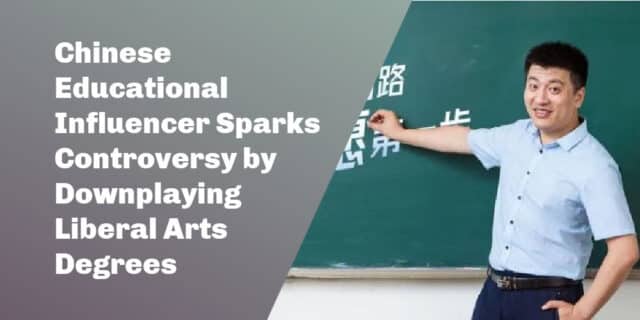
Zhang Xuefeng and Liberal Arts
Oops, he did it again. Chinese educational internet influencer and exam prep coach Zhang Xuefeng (张雪峰) recently stirred up another trending discussion by seemingly belittling liberal arts during a livestream. He claimed that having a Liberal Arts Degree is equivalent to ending up in a lower status within the service industry.
Not too long ago, Zhang already caused some controversy by strongly discouraging Chinese youth from pursuing a degree in journalism.
This time again, many people are offended by Zhang’s remarks, suggesting it is wrong and extreme of him to lump all liberal arts majors together. However, there are also those who agree, saying that choosing an educational route in science and engineering is more fruitful. The numbers also indicate that science and engineering graduates are much more likely to be employed after getting their degree than liberal arts graduates.
Zhang Xuefeng later attempted to clarify his comments and offered a quasi-apology by wearing a T-shirt saying ‘sorry.’ He emphasized that he did not intend to criticize the service industry, expressing that there is nothing inherently wrong with being a part of it. Instead, he just wants people to be realistic about their expectations when choosing their educational paths.
Zhang’s comments are especially impactful due to a record number of Chinese college graduates entering the job market while facing bleak employment outlooks. In this light, picking the right educational path has become an extra important and weighty issue for both students and their parents.
What’s Popular

MayDay Alleged Lipsync Incident
The question of whether the members of the Taiwanese pop band Mayday lip-synced during their concert on the Chinese mainland has stirred up discussions on Chinese social media, amassing millions of views recently. The popular band performed in Shanghai on November 16, but speculations about lip-syncing arose when some concertgoers shared videos on social media, casting doubt on whether they had sung live.
This story became especially big when one music blogger, Shenglixue (@声理学) used specific software to analyze the videos, asserting that the singers were lip-syncing. The issue gained so much attention because lip-syncing during performances, or pretending to play musical instruments, goes against the guidelines issued by the government-backed China Association of Performing Arts and is considered a form of deception.
However, the band denied allegations of not singing live, labeling the rumors as “malicious slander.” Their concert in Paris was also livestreamed last week, allowing attentive listeners to occasionally hear off-key notes that were definitely not lip-synced. Earlier this week, a veteran music agent and associate professor from Taiwan’s Nantai University’s Department of Popular Music Industry also weighed in on the issue, refuting the lip-syncing allegations.
The music blogger who initially published the allegations has vowed not to post about Mayday anymore, as his personal details, including his mum’s name and photos, were leaked online by doxers.
What’s Memorable
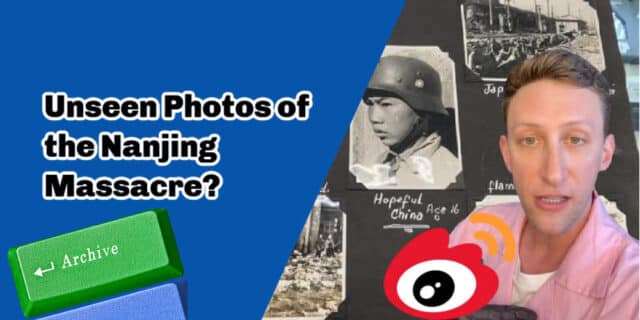
Increasing International Attention for Nanjing Massacre
As Weibo commemorates the Nanjing Massacre this week, we revisit an article from last year about an American pawn shop owner discovering potentially unseen photos from this particularly gruesome chapter of the Second Sino-Japanese War.
When a TikTok video showcasing these images went viral, Chinese netizens were astonished by how little awareness Western social media users had about the events during the Japanese invasion of Nanjing in 1937. While it remained uncertain whether the photos found by the pawn shop owner were genuinely previously undiscovered images of Nanjing, the entire incident ultimately shifted towards fostering greater international awareness of this historical tragedy.
Weibo Word of the Week
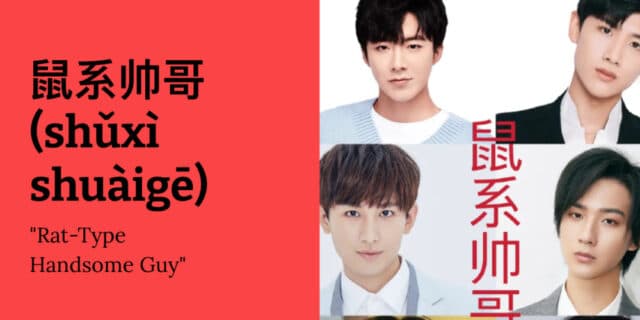
“Rat-Type Handsome Guy” | Our Weibo Word of the Week is “Rat-Type Handsome Guy” (shǔ xì shuài gē 鼠系帅哥).
The term “Rat-Type Handsome Guy” (鼠系帅哥) has actually been around for some time, but attracted more attention on Chinese social media recently. The word is part of a group of other terms to describe popular aesthetics of famous men with features resembling animals.
In 2022, for example, the “Monkey-Type Handsomes” (猴系帅哥) were especially popular. The term was used to describe the kind of Chinese celebrities who were undeniably handsome and also showed some resemblance to monkeys due to their strong brow ridges, narrow and long face, thin upper lip, and prominent T-zone.
When categorizing handsome men in China’s entertainment industry into animal-types, from monkeys to snakes, from dogs to birds, it is not always only about facial features but also about a certain air or vibe (氛围感) that surrounds an idol. A loyal and cute dog-like vibe, a calm and strong ox-like feeling, or a sharp and sexy cat-like character.
Thi year, the ‘rat-like’ handsome men have been more in vogue. They have small eyes, a pointed jaw and a small mouth. Although not all actors who are rat-like are deemed handsome, those that are handsome are all the more rare – and popular.

Chinese actor Yang Di (杨迪) went trending for being a representative of the “Rat-Type Handsome Guy” (鼠系帅哥) recently. Although he himself proudly posted about it on Weibo, there are also many netizens who think that being ‘rat like’ is actually not really attractive and not worth boasting about.
This is an on-site version of the Weibo Watch newsletter by What’s on Weibo. Missed last week’s newsletter? Find it here. If you are already subscribed to What’s on Weibo but are not yet receiving this newsletter in your inbox, please contact us directly to let us know.
Stories that are authored by the What's on Weibo Team are the stories that multiple authors contributed to. Please check the names at the end of the articles to see who the authors are.

Also Read
Newsletter
Weibo Watch: China’s Online Feminism Is Everywhere
From ‘Her Story’ to an online campaign highlighting the shortcomings of sanitary pads, China’s online feminism is taking shape in new ways.
Published
2 weeks agoon
December 8, 2024
PREMIUM NEWSLETTER | ISSUE #40
This week’s newsletter:
◼︎ 1. Editor’s Note – China’s Online Feminism Is Everywhere
◼︎ 2. What’s New – A Closer Look at Featured Stories
◼︎ 3. What Else to Know – South Korea and Syria Trending on Weibo
◼︎ 3. What’s Noteworthy – Dutch Woman Searches for Chinese Roots in Anhui
◼︎ 4. What’s Memorable – About the Notre Dame Fire and the Old Summer Palace
◼︎ 5. Weibo Word of the Week – 飘然 (Piāorán)
Dear Reader,
Hello again! After a brief hiatus, I’m happy to reconnect with you all. My time away was spent traveling across China to deliver addresses at the Embassy and Consulate of the Kingdom of the Netherlands. Preparations and travel left less time for the site than anticipated, but it was well worth it. It was an honor to serve as the Cleveringa speaker in both Beijing and Shanghai and to meet so many of you who have been reading and supporting What’s on Weibo.
Cleveringa (1894–1980) was a distinguished Dutch professor and dean of law at Leiden University. In 1940, he gave a historic speech protesting the dismissal of two Jewish colleagues under Nazi policies. His bold act is commemorated annually through Cleveringa Lectures, not only at Leiden University but also at Dutch embassies worldwide. This year, the Cleveringa Lecture series extended to Beijing, where I had the opportunity to contribute to this meaningful tradition.
The topic of my lecture was “Fifteen Years of Weibo: New Voices Shaping Social Power in China,” in which I discussed how Weibo has become much more than just another social media platform. It has turned into a space where state media channels, brands and businesses, everyday citizens, meme creators, and unlikely heroes ignite national conversations and even drive social change. In the lecture, I explored the various stories that went viral and left a lasting impact over the years, further diving into the unique power of Chinese social media to shape public discourse and connect a diverse nation in unprecedented ways.
Meeting many of you—embassy staff, journalists, and students—at these events was a highlight. It’s heartwarming to know What’s on Weibo is a valuable resource to many of you for staying tuned into digital China’s trends.
Clashes and Controversies over Feminism
A recurring topic during discussions was Chinese feminism, especially as the Orange the World campaign began on November 25, marking 16 days of global action against gender-based violence. In honor of this, the Embassy of the Netherlands glowed orange to support #OrangeTheWorld.
One of the major stories I explored in my lecture is also strongly connected to feminism: the Xuzhou chained mother in 2022. This case was a pivotal moment for China’s online feminist movement, spotlighting issues such as human trafficking and the silent complicity of local village or county authorities that allowed such tragedies to unfold. I went on to discuss the evolving nature of online feminism in China.
This topic of online feminism has resurfaced on Weibo multiple times in recent weeks—though not always in a positive light.
In November, Chinese e-commerce giant JD.com canceled its “Singles Day” collaboration with comedian Yang Li following male backlash and boycott threats over her critiques of male confidence. While some celebrated the decision, many women vowed to boycott JD in protest, calling out misogyny and double standards. This incident reflected how anti-feminist sentiments in China not only influence public discourse but also shape business and marketing dynamics.
Over the past two weeks, the Chinese hit film Her Story, directed by young female filmmaker Shao Yihui (邵艺辉) and released on November 22, also triggered online discussions. Some critics labeled it a “boxer film” (拳师电影). As explained in Wendy Huang’s article, in China, the term “boxer” (拳师) is sometimes used to critique certain feminists. The second character in the word for feminists (“权” quán) is pronounced the same as the first character in “boxer” (“拳” quán). This term has therefore become used to mock feminists who are seen as overly aggressive.
These examples—and there are many more recent ones—highlight the negative connotations of ‘feminism’ in China. Not too long ago, the Communist Youth League of China even called “extreme feminism” a “malignant tumor on the Internet.”
Over the past ten years, there have been many discussions on the state of feminism in China today. During this time, feminism has seemingly become an increasingly uncomfortable term.1
“Feminism was never a taboo topic in China,” women’s rights activist Meili Xiao wrote in the New York Times in 2015. She explained: “Before, our messages were consistent with those of the government, which calls itself an advocate of women’s rights.” That sentiment started to change, especially over the past decade, as many women perhaps no longer want what the government wants for them.
In 2018, while the Me Too Movement dominated Western media discourse, various renowned feminist Weibo accounts, including Feminist Voices (女权之声), were pulled offline. In the years that followed, feminist groups were also censored on other platforms, from WeChat to Douban.
In recent years, feminism on the Chinese internet has grown increasingly controversial—not just because of censorship, which ties more to politics and the repression of grassroots activism—but also due to social disagreements over what Chinese feminism is or should be.
It is not uncommon for Chinese feminists of various generations and backgrounds to clash (read about one famous clash here). Some popular online groups of vocal women are sometimes degradingly called “countryside feminists” (中华田园女权), a term used to describe women who label themselves as feminists but cherry-pick the rights they think they should have. Some mainland liberals argue that feminism in China should not focus solely on gender differences but raise voices for broader civil rights activism.
Perhaps most important to realize is that Chinese feminism is not Western feminism. Western feminism, influenced by the sexual revolution and movements like gay liberation, brought forth academic studies on gender and sexuality that were heavily dominated by Western cultures, histories, and voices. These ideas often emphasized resistance against male dominance alongside liberalism and capitalism.2
While there is an ongoing effort in China to adapt and reinterpret Western feminist discourse to align with local cultural realities, many believe that the liberation of women cannot be separated from broader societal emancipation and should transcend the Western binary division of the sexes.
However, some Chinese feminists continue to incorporate Western feminist frameworks to advance feminism in the Chinese context, which often leads to resistance and even online hate from those who view these efforts as ‘disruptive’ or as ‘promoting opposition between the sexes.’
Scattered Revolutions
The insightful work Weibo Feminism: Expression, Activism and Social Media in China (2022) by Xue and Rose explores how Weibo serves as a platform for diverse feminist discourses. These include questioning traditional values like Confucian filial piety, examining the one-child policy, and engaging in broader discussions on reproductive autonomy among feminists from different social, ethnic, and professional backgrounds.

Weibo Feminism by Xue and Rose.
Despite tensions between Western-influenced feminists and those more aligned with communist ideals, Weibo has also allowed for more independent feminist voices to emerge. These voices focus on systemic change and collective solidarity, reinterpreting global feminist ideas to fit China’s unique socio-cultural context.
Facing censorship and pressure, Weibo feminists have adopted decentralized strategies—what Xue and Rose call “scattered revolutions.” Instead of building massive accounts, they create smaller, distributed communities to impact larger debates: “You forbid us to gather anywhere, so we will be everywhere.”
Every now and then, these voices can be heard all over Weibo. Recently, these voices surfaced in online conversations about misleading sanitary pad advertisements, which expanded into broader discussions about women’s health, safety, and rights.
Ruixin Zhang wrote about grassroots efforts to combat menstrual stigma and hold Chinese companies accountable here. Wendy Huang covered the discussions surrounding Her Story here.
There is much more to say about China’s online feminism, a topic that will undoubtedly come up more often in the time to come.
Looking Ahead
For those I didn’t meet but who are interested in the topic of my Cleveringa speech, I’ll dive deeper into Weibo’s 15-year anniversary on What’s on Weibo early 2025. There are also exciting changes coming to the site, allowing for deeper insights into special topics—more on that soon!
If you appreciate What’s on Weibo and want to stay up to date, please continue as a premium member, tell colleagues and friends to subscribe, or explore group accounts for your office (email me for group discounts). To maintain independence, I still don’t do advertisements or sponsorship deals, so your support is what keeps everything going.
Meanwhile, if you’d like to connect on social media for more frequent updates, follow Whatsonweibo on Instagram here or follow my personal account on X. I’ve also recently joined Bluesky, please find me here.
Warm regards,
Manya Koetse
1 FYI: The term ‘feminism’ in itself is a Western term, which is translated in Chinese as 女权主义 (nǚquán zhǔyì), meaning “women’s rights ideology” as the term 女权 (nǚquán) combines 女 (nǚ), meaning “woman,” with 权 (quán), meaning “rights” or “power.” 主义 (zhǔyì) translates to “ideology” or simply “-ism.”
2 More on this: Zhou Huashan (周华山). 2000. Xingbie yuejie zai Zhongguo (性别越界在中国) [Crossing the Borders of Gender in China]. Hong Kong: Xianggang Tongshi Yanjiushi (香港通识研究室), 16–18.
What’s New

Shortcomings in Menstrual Pads | Sanitary pads have never been a bigger topic of debate on Chinese social media as it’s been over the past few weeks. What began with one blogger’s discovery of menstrual pads falling short of their advertised size has grown into a broader movement, demanding better-quality products and greater awareness of menstrual health. Insightful article by Ruixin Zhang 👇

Good Stuff | The Chinese comedy-drama Her Story (好东西, literally “Good Stuff”), directed by Shao Yihui (邵艺辉), has been gaining attention and sparking discussions on Weibo since its late November release in mainland China. Beyond the discussions of plot and central themes, Her Story reflects the increasing success and influence of women filmmakers in the Chinese film industry.

A Caravan of Cyclistst | From city marketing to the spirit of China’s new generation, there are many themes behind the recent Zhengzhou trend of thousands of students cycling to Kaifeng overnight.
What Else to Know

It was a sleepless night in South Korea on December 4 after President Yoon Suk-yeol unexpectedly declared martial law on Tuesday evening. On Weibo, many netizens also stayed awake, closely following the unfolding events in Seoul. Geopolitical events rarely dominate the entire trending topic list on Weibo, but this was such an extraordinary moment for China’s maritime neighbor that it took over the hot lists.
The next day, after the martial-law declaration was lifted, online banter erupted about the South Korean ‘elite’ Special Forces. Netizens were amused by how clumsily they climbed through windows, falling short of expectations shaped by military dramas like Descendants of the Sun, where troops are portrayed as near-superheroes. In contrast, many found opposition leader Lee Jae-myung’s wall-climbing skills to enter parliament far more impressive. (See the online video here).
While South Korea sunk deeper into what’s being called a constitutional crisis, rebels took control of Syria’s capital and President Bashar al-Assad resigned and left Syria on Sunday. Some banter aside, the latest geopolitical upheaval has been attracting a lot of attention on Weibo. Noteworthy enough, Chinese state media even linked the situations in South Korea and Syria under the hashtag “Sorting Out the Changes in the Situations in Syria and South Korea” (#梳理叙利亚和韩国局势变化#).
“Actually, the situations in Syria and South Korea are, in some ways, quite similar,” one Weibo commenter wrote: “Both happened really suddenly, and both cases (will) end with the president stepping down. However, as of now, it seems that the South Korean president will face further accountability, while the Syrian president, if he lands smoothly in Russia, is at least currently in a slightly better position than his South Korean counterpart.”
Despite official media narratives linking the two situations under one headline, most online discussions highlight key differences. The South Korean crisis is largely viewed as the result of a society that, after forty years of transformation, can no longer tolerate a leader infringing on constitutional rights. In contrast, Syria’s upheaval is seen as the product of a political landscape lacking a foundation for democracy, leaving it vulnerable to becoming a mere chess piece in the broader geopolitical game.
What’s Noteworthy

Last week, on the occasion of my lecture at the Consulate of the Kingdom of the Netherlands in Shanghai, I had the pleasure of meeting Fengli Bottema, a bright and determined Dutch woman who was adopted from China and has now returned to her birth country in hopes of finding her biological parents.
Fengli was adopted in 2003 at the age of two when her Dutch parents traveled to the Department of Civil Affairs in Anhui Province to meet her and bring her home to the Netherlands. For the first two years of her life, Fengli was lovingly cared for by a foster family in Hefei—a family with whom both Fengli and her adoptive parents have remained in touch. Grateful for the love and support she received from both her foster and adoptive parents, Fengli is now hoping to complete the puzzle of her family history by reconnecting with her biological parents.
Before resuming her medical studies in Rotterdam this coming January, Fengli is currently taking a semester of language courses at Fudan University in Shanghai. While pursuing her studies, she is also actively searching for more clues about her biological family.
Her search has gained attention on Chinese social media, especially on Douyin (see video) and Weibo (#荷兰23岁女孩到安徽寻根#).
Fengli’s story began on May 23, 2001, when she was found in front of the Cuozhen Police Station (撮镇派出所) in Feidong County, Anhui Province. She was brought to a welfare institute by police staff and placed under care. Based on the condition of her umbilical cord, it was determined that she was a healthy newborn. She also had several distinctive birthmarks on her chest, back, and left upper limb.

Fengli’s story represents the journey of many adoptees from China who hope to connect the dots of their past and learn more about their roots. If you have any information or clues that could help Fengli, she warmly welcomes relevant messages at fengli.bottema@gmail.com.
What’s Memorable

This week marked the grand reopening of the Notre Dame Cathedral in Paris, an event attended by numerous prominent figures and world leaders, including US President-elect Trump and Ukrainian President Zelenskyy. On Weibo, popular comments included phrases such as: “The Notre-Dame Cathedral in Paris can reopen, but our Old Summer Palace (Yuanmingyuan) can never be restored to its former glory.”
In 2019, while people around the globe mourned the devastating fire that destroyed parts of the 800-year-old cathedral, Chinese social media users collectively reflected on a painful chapter of their own history: the burning of the Old Summer Palace in 1860 by Western forces. For this week’s archive pick, we revisit the 2019 response on Weibo to the Notre Dame fire, along with the column we wrote to provide context.
Weibo Word of the Week

Fluttering | Our Weibo word of the week is 飘然 (piāo rán), which has no exact English equivalent but could be translated as “fluttering,” “gracefully drifting,” or “floating in the air.”
This week, the word gained significant attention on Chinese social media after it came to light that it was the favorite word of Taiwanese writer Chiung Yao (琼瑶), who passed away by her own choice on December 4, leaving behind a beautiful and impressive farewell letter.
Chiung Yao, one of China’s most beloved romance novelists, was 86 years old when she departed this world. The hashtag “Chiung Yao Has Passed Away” (#琼瑶去世#) received over 840 million views on Weibo.
Among her many works, Chiung Yao is cherished by many netizens in mainland China as part of their collective memories from the 1980s and 1990s. Some of the most iconic Chinese dramas, such as My Fair Princess (also: Return of the Pearl Princess, 還珠格格), were written by Chiung Yao.
Yao had chosen to “depart gracefully and lightly”, or rather, 飘然 (piāo rán). The character 飘 (piāo) means “waving to and fro” or “fluttering.” The character 然 (rán) signifies “in such a manner” or “like this,” often used to describe a state or condition. Together, 飘然 conveys a sense of effortless fluttering, floating away with ease and grace.
Chiung Yao was found on her sofa at home. The cause of death was determined to be asphyxiation due to carbon monoxide poisoning.
In her farewell letter to loved ones and fans, she wrote the following (my translation):
“To all my dear friends:
Do not cry, do not grieve, and do not feel sad for me. I have already fluttered away [翩然 piānrán] effortlessly.
I love the word “翩然” [piānrán]. It represents flying in the air independently, easily, and freely. Elegantly and gracefully, I have shed the body that gradually caused me pain and have ‘fluttered away,’ transforming into snowflakes flying into the sky.
This was my wish. “Death” [死亡] is a journey everyone must take—it is the final significant event in life. I did not want to leave it to fate, nor did I want to wither away slowly. I wanted to have the final say in this final event.
God has not designed the process of life particularly well. When a person grows old, they have to go through a very painful period of ‘becoming weak, degeneration, illness, hospitalization, treatment, and fatal illness.’ This period, may it be long or short, is a tremendous torment for those who are destined to grow old and die! Worst of all, some may become bedridden, dependent on tubes for survival. I have witnessed such tragedies, and I do not want that kind of “death.”
I am a “spark,” and I have already burned as brightly as I could. Now, before the flame finally dims, I have chosen this way to make a light departure. I have recorded everything I wish to say in my video “When Snowflakes Fall Down” (当雪花飘落) [link]. I hope my friends can watch it a few times to grasp everything I wanted to express.
Friends, do not mourn my death but smile for me! The beauty of life lies in the ability to love, hate, laugh, cry, sing, speak, run, move, be together until death parts us, live freely, despise evil with a passion, and live life boldly. I have experienced all these things in my lifetime! I truly ‘lived’ and did not waste this life.
What I find hardest to let go of are my family and all of you. “Love” is what is tightly bound to my heart, and I am reluctant to part with you. To allow my soul (if humans even have souls) to also ‘flutter away,’ please laugh for me, sing loudly for me, and dance in the breeze for me! My spirit in the heavens will dance together with you!
Farewell, my dearest ones! I am grateful for this life, where I had the chance to meet and know you all.
Take note of the way I died: I was at the final station of my life! For those of you who are still young, never give up on life lightly. Momentary setbacks or blows may be the “training” for a beautiful life. I hope you will be able to endure those, as I did, and live to 86, 87.. years old. When your physical strength fades, then decide how to face death. By then, perhaps they will have found more humane ways to help the elderly “leave joyfully.”
Dear friends, be brave, be the greatest version of yourself. Do not waste your journey through this world! Though this world is not perfect, it is filled with unexpected joys, sorrows, and laughter. Don’t miss out on all the wonders out there for you.
There are a thousand more things to say, but in the end, I wish everyone health, happiness, and a life of freedom and joy.”

This is an on-site version of the Weibo Watch newsletter by What’s on Weibo. Missed last week’s newsletter? Find it here. If you are already subscribed to What’s on Weibo but are not yet receiving this newsletter in your inbox, please contact us directly to let us know.
Featured
Weibo Watch: “Comrade Trump Returns to the Palace”
From stocks to memes, Chinese netizens turn Trump’s win into a blend of playful speculation and some serious debate.
Published
1 month agoon
November 6, 2024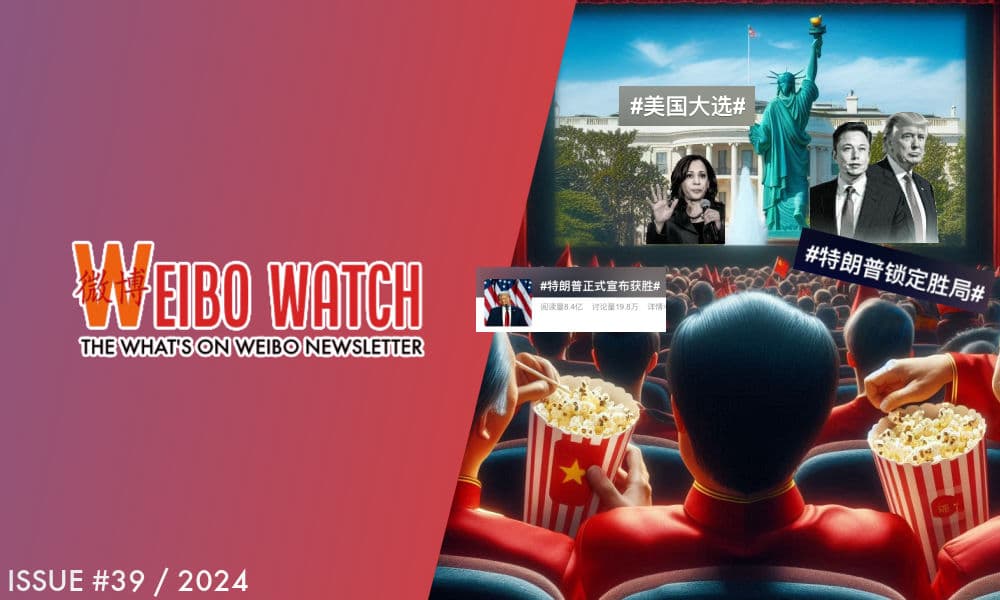
PREMIUM NEWSLETTER | ISSUE #39
This week’s newsletter:
◼︎ 1. Editor’s Note – “Comrade Trump Returns to the Palace”
◼︎ 2. What’s New – A closer look at featured stories
◼︎ 3. WeiboWatch List – Online discussions to watch
◼︎ 4. What’s Noteworthy – Hu Xijin is back
◼︎ 6. What’s Popular – New series features story of Xi’s father
◼︎ 7. What’s Memorable – Trump’s 2016 win
◼︎ 8. Weibo Word of the Week – Digital Ibuprofen
Dear Reader,
“Good morning, everyone. A new day with global impact has begun,” Weibo blogger “MLRS270” wrote early Wednesday morning, China time. Weibo, like the rest of the world, has been closely watching how American voters would shape the outcome of the 2024 US presidential election. With half a million followers, MLRS270 claimed that Harris’s victory was already “set in stone.”
Twelve hours later, however, the online discussions looked very different. Trump’s win dominated Weibo trending topics and the hashtag “Trump Officially Declares Victory” (#特朗普正式宣布获胜#) received over 870 million views.
“The upcoming four years are going to be entertaining,” a popular comment said. Posts, videos, and memes on Trump’s win immediately began to surface, not just on Weibo but also on other Chinese social media platforms like WeChat and Xiaohongshu.
The ‘entertainment’ surrounding the American elections had already started earlier. Most noteworthy was the sudden surge in stock value for a Chinese company called Sichuan Wisdom Co. Ltd. (川大智胜). This spike occurred simply because the company’s name sounds like “Trump winning.”
The Chinese name, Chuān Dà Zhì Shèng (川大智胜), belongs to a software company unrelated to Trump. But its name’s first character, Chuān—which in this context refers to Sichuan—is also used in the Chinese transliteration of Trump’s name, leading some to interpret it as “Trump Grand Wisdom Victory.”
For fun, Chinese investors began buying shares. “To support you, I’ve bought some stocks,” one Weibo user from Sichuan wrote, posting an orange heart emoji. The stocks continued to rise when Trump’s actual win became known (#川大智胜午后涨停#).

Chuān Dà Zhì Shèng (川大智胜) stocks going up.
Meanwhile, another company named Haers (哈尔斯 Hāěrsī), which sounds like Harris in Chinese, saw a sudden drop in its stock. That Zhejiang company, which produces vacuum-insulated containers, also got caught up in the elections (#哈尔斯股价大跌#).

Some Chinese economic news channels noted that “external developments” were clearly playing a role in these market fluctuations, and warned people that this kind of short-term, non-logical speculative trading was not recommended. They suggested it would be better to “enjoy the show from the sidelines” (“看个热闹”).
Nevertheless, the momentary fluctuation in ‘Trump’ versus ‘Harris’ stocks did show a general preference for Trump among the Chinese online public.
While the idea of Trump being a more ‘entertaining’ American president than Harris often comes up in Chinese online discussions on the election outcome, there are also more serious discussions about whether Trump’s presidency would be good or bad for China.
Despite what happened in the past, many netizens suggest that Trump, with his pragmatic and business-oriented mindset, will be “more favorable” for China and “better for global stability.” Despite the downsides of protectionist trade policies and high tariffs on China, it is believed that the potential benefits would outweigh them through, for example, improved diplomatic relations and cooperation in tech. Trump’s view of China as an open economic competitor would allow China to respond directly and strategically.
Harris, on the other hand, is viewed less favorably by Chinese social media commenters who believe that China would be seen as a political adversary under her presidency, employing underhanded tactics to contain and undermine China. In their view, she represents the American political elite, which they perceive as engaging in covert power plays worldwide for political gain. Trump’s explicit focus on economic competition is something many find more relatable.
Her perceived “elitism” is also linked to her calls for the need to “stay woke,” a message that hasn’t resonated with many Chinese netizens, who often associate “wokism” with political elites and Western hypocrisy. In contrast, many prefer to support the more practical and relatable “grassroots.”
However, many also believe that for China, it does not matter who won in the end. “In reality, whoever takes office brings new challenges,” a well-known military and current affairs blogger (@后沙月光本尊) wrote. This sentiment was echoed by many others. When Iraqi Weibo blogger Omar (@欧玛omar) suggested that Trump’s return to power would be unfavorable for China due to his “wild schemes against China” and his “crude remarks,” dozens of commenters replied: “It would’ve been the same either way.” “The Democrats are no different.” “China is not afraid.”
A general consensus seems to be that, if it makes no difference to them who’s in the White House, it might as well be someone they find amusing and interesting. In this regard, Trump is the preferred winner for many netizens, who congratulate “the King of Understanding” for his “reemployment.”

Chinese meme: “Trump returns to the palace.”
Trump earned the title “King of Understanding” (dǒngwáng 懂王, also ‘King of Knowing’) on Chinese social media for his often-quoted claims of understanding complex issues better than anyone else (“people are really surprised I understand this stuff”). (Harris, by the way, was nicknamed ‘Sister Haha’ (哈哈姐) or the “King of Laughter” (笑王) for her frequent, distinctive laughter during public appearances.)
Another famous nickname for Trump is “Comrade Jianguo” (建国同志), meaning “Comrade Build-the-Country.” This nickname humorously suggests that Trump’s leadership, which is meant to “make America great again,” inadvertently accelerates China’s rise. Over the years, these playful nicknames have blended mockery with affection, reflecting the humorous perspective many Chinese social media users have toward Trump’s antics.
While Western platforms like Reddit are filled with shock and dread today, Weibo is mostly buzzing with lighthearted banter and optimism. “Looking ahead, keep an eye on sectors like artificial intelligence, autonomous driving, fintech, and Musk-related stocks,” one commenter wrote. “Trump loves Elon. We might even see peace between Russia and Ukraine, or Kim Jong-un watching an NBA game with Trump. And of course, we’d welcome Comrade Jianguo to visit Hainan for some tourism—after all, he loves doing business, and we have free trade.”
When blogger Wu Pei (@吴佩) asked netizens what Trump’s win would realistically mean for them, responses ranged from “crashing stock markets” and “setbacks for EV companies” to “heightened trade frictions.” The only thing people seem to agree on is that it would be best to sit back and watch the spectacle as “Comrade Trump returns to the palace.”
This edition of Weibo Watch was co-curated by Miranda Barnes. Wendy Huang contributed an insightful article on the recent controversies surrounding Chinese livestream stars, and Ruixin Zhang provides a must-read piece on the ongoing crackdown on online smut.
Best,
Manya Koetse
(@manyapan)
What’s New

Forbidden Stories | A recent crackdown on Chinese authors writing erotic webnovels has sparked increased online conversations about the Haitang Literature ‘Flower Market’ subculture, the challenges faced by prominent online smut writers, and the evolving regulations surrounding digital erotica in China. But how serious is the ‘crime’ of writing explicit fiction China today?

Viral Bao’an | This is the video that made a Xiaoxitian (Shanxi) security guard go viral in China. In the popular video, he tells a Douyin vlogger about his raise from 1,700 yuan/month (US$240) to 2,200 yuan ($310), thanks to a tourism boom driven by the popular game Black Myth: Wukong. Shortly after gaining online fame, he shared in another video that he’d been dismissed, looking tired and saying, “They [the superiors] told me not to work anymore. I didn’t say anything wrong, but they don’t want me to continue.” This sparked a wave of outrage online. More about that here 👇.

Livestream Scandals | As livestreaming continues to gain popularity in China, so do the controversies surrounding the industry. Negative headlines involving high-profile livestreamers, as well as aspiring influencers hoping to make it big, frequently dominate Weibo’s trending topics. ‘Wanghong’ used to be a mark of online fame, but now, it’s increasingly tied to controversy and scandal. Read this deep dive ➡️
WeiboWatch List
🚫 Forbidden Fashion
A group of foreign fashion designers linked to the brand Fecal Matter were denied entry to Beijing’s Forbidden City on October 15. The group, consisting of American designer Rick Owens, his wife Michèle Lamy, and Fecal Matter members Hannah Rose Dalton and Steven Raj Bhaskaran, made headlines internationally after posting photos on social media of themselves posing outside the Forbidden City. According to their post, security had informed them that they could enter if they removed their makeup and changed into “normal” clothing, a request they declined. While the designers framed the incident as motivation to continue fighting for “greater acceptance and tolerance for difference around the world,” Chinese media and social media users viewed it as a sign of disrespect (#外国游客因着装问题被劝离故宫#).

The Forbidden City issued a statement on the 18th, clarifying that it has no specific dress code for visitors, “as long as it’s not too exaggerated.” A top comment on a Weibo thread about the incident, which received over 100,000 likes, read: “When in Rome, do as the Romans do (客随主便, kè suí zhǔ biàn). If you insist on your freedom to dress as you please, then don’t come to my house!”
👻 Halloween Crackdown
The Forbidden City incident wasn’t the only costume-related controversy in China this month. In Shanghai, local police patrolled popular areas to monitor Halloween celebrations. Although there was no nationwide or citywide ban, some videos showed costumed individuals being escorted away by police or forced to remove their outfits. There was a significant police presence on Julu Road and in Zhongshan Park, with the latter even temporarily closed to prevent large gatherings.
Last year, Halloween celebrations in Shanghai caused a frenzy on the Internet. Instead of traditional Halloween themes, young people on Julu Road and beyond brought pop culture memes and social commentary to life through creative costumes. Many outfits were playful, some queer, and others served as social critiques, with costumes depicting surveillance cameras and COVID-19 medical workers. Some even described the event as “China’s very own pride walk.” However, it’s now clear that local authorities are keen to prevent Shanghai’s Halloween festivities from evolving into a larger cultural celebration or protest.
📉 Math Competition Outcome
You might remember the story that went viral earlier this year about Jiang Ping (姜萍), the seventeen-year-old vocational school student who reached the top 12 on the finalist list of the Alibaba Global Mathematics Competition, competing against students from elite universities worldwide. Her success story—coming from a humble rural family and excelling in math as a fashion student under the guidance of her teacher Wang Runqiu (王润秋)—initially resonated but was soon questioned. Critics doubted the authenticity of Jiang Ping’s initial score, not only because she wasn’t a math major but also because her score allegedly surpassed her own teacher’s.
Now, the results of the 2024 Alibaba Mathematics Competition, originally set for August, are finally out. Neither Jiang Ping nor her teacher appears on the list. The competition committee released a statement confirming that Wang Runqiu had assisted Jiang Ping in the preliminaries, violating the “no collaboration with others” rule. It’s a disappointing outcome—not only because the competition allowed room for cheating, which Wang and Jiang exploited, but also because Jiang had become an inspirational role model for many math-loving girls from non-elite backgrounds. Now, she has fallen from that pedestal.
🔪 Xiaomi SU7 Stabbing Incident
A 23-year-old man from Nantong named Kang, who had just purchased the Tesla competitor Xiaomi SU7, recently became a trending topic on Chinese social media after fatally stabbing a biker enthusiast. Kang, who was part of a motorcycling chat group, shared his new 300,000-yuan ($42,200) Xiaomi SU7 EV in the group, only to be mocked by some members. When the Xiaomi EV owner and bikers later met in person outside a coffee shop popular with bikers, the encounter escalated. Kang pulled out a knife, fatally stabbing one of the group members, then fled in his brand-new car, crashing through a storefront and ramming into motorcycles. A video of the incident went viral online. Kang was arrested shortly afterward.

The incident sparked conversations about how the 23-year-old, a recent university graduate, reached this breaking point. A popular blogger, @黑哥爆料, suggested that Kang’s parents had supported him in buying the costly car, hoping he would work hard and settle down. Lacking the social recognition he had hoped for, the situation with the bikers pushed him to his limits. While Kang bears responsibility for his actions, the blogger suggests that the group could have de-escalated the tension by acknowledging him instead of bullying him. In the end, this incident has devastated multiple lives, including the victim’s, Kang’s, and also Kang’s parents, who now bear the financial and emotional toll of their son’s actions.
🍰 Swiss Roll Conversations
“How to divide 8 Swiss rolls?” (8个瑞士卷怎么分?) This question recently became a trending topic on Weibo after a stay-at-home mom shared a video about her experience buying a box of Swiss rolls with eight pieces. Her daughter ate two, her son ate two, and her husband ate two. She assumed the last two pieces were hers, but her husband scolded her, saying she should set a good example by not snacking, and that it was selfish not to save the last pieces for the kids.
The video sparked widespread debate, quickly becoming a symbol for broader issues like gender relations, the division of household labor, and the role of stay-at-home moms. Some feminists expressed outrage over the incident, while others suspected the video was staged to create controversy and attract views. The incident has now drawn so much attention that cyberspace authorities have intervened to investigate whether the Swiss Roll story is genuine. Bon appétit? Let’s see how this unfolds.
What’s Noteworthy

For nearly 100 days, since July 27, the well-known social and political commentator Hu Xijin (胡锡进) remained silent on Chinese social media. This was highly unusual for the columnist and former Global Times editor, who typically posts multiple Weibo updates daily, along with regular updates on his X account and video commentaries.
Various foreign media outlets speculated that his silence might be related to his comments about the Third Plenum and Chinese economics, especially regarding China’s shift to treating public and private enterprises equally. Without any official statement, Chinese netizens were left guessing about his whereabouts. Most assumed he had, in some way, taken a ‘wrong’ stance in his commentary on the economy and stock market, or perhaps on politically sensitive topics like the Suzhou stabbing of a Japanese student, which led to his being sidelined for a while.
On October 31, Hu suddenly reappeared on Weibo with a post praising the newly opened Chaobai River Bridge, which connects Beijing to Dachang in Hebei—where Hu owns a home—significantly reducing travel time and making the more affordable Dachang area attractive to people from Beijing. The post received over 9,000 comments and 25,000 likes, with many welcoming back the old journalist. “You’re back!” and “Old Hu, I didn’t see you on Weibo for so long. Although I regularly curse your posts, I missed you,” were among the replies.
Not everyone, however, is thrilled to see his return. Blogger Bad Potato (@一个坏土豆) criticized Hu, claiming that with his frequent posts and shifting views, he likes to jump on trends and gauge public opinion—but is actually not very skilled at it, which allegedly contributes to a toxic online environment. Other bloggers also take issue with Hu’s tendency to contrast himself, or disagree with the stances he makes in new posts.
When Hu wrote about Trump’s win, the top comment read: “Old Trump is back, just like you!”

Hu seems delighted to be back. He hasn’t mentioned his absence but shared a photo from 1978, when he joined the military, reflecting on his journey of growth, learning, and commitment to the country. He has a way of admiring himself—and, occasionally, we don’t mind admiring him too. Welcome back, Hu.
What’s Popular

The TV series Years in the Northwest (西北岁月), premiering on CCTV 1 this week, tells the story of Xi Jinping’s father, longtime PLA leader Xi Zhongxun (习仲勋, 1913-2002). This is the first historical drama to focus on Xi Zhongxun, highlighting his “extraordinary experiences and achievements” during the 25 years he spent in the Shaanxi-Gansu border region from 1927 to 1952.
Xi Zhongxun joined the Communist Party in 1928 and went on to become a prominent revolutionary and political leader. In the northwest’s Shaanxi-Gansu border region, he played a critical role in establishing revolutionary bases. Working alongside notable figures like Peng Dehuai (彭德怀), his efforts were instrumental in consolidating Party influence in the region.
On social media, some viewers of the first episode have shared emotional responses, while others praise popular actor Wu Lei (吴磊, 1999) for his portrayal of the young Xi Zhongxun.

One interesting aspect of the series’ announcement on Weibo is the unusually high number of shares—over 620,500—compared to the relatively low number of comments, suggesting that online discussions surrounding the series are controlled and contained.
What’s Memorable

On the morning of November 9, 2016 (Beijing time), the world received news of Donald Trump’s victory in the U.S. presidential election. In our coverage of Trump’s win at the time, we provided insight into Chinese reactions to America’s unconventional new president. From official Chinese media to Weibo netizens, responses to Trump’s triumph were favorable, critical, humorous, but above all, mixed.
Weibo Word of the Week

Digital Iboprofen | Our Weibo word of the week is 电子布洛芬 (diànzǐ bùluòfēn), which translates to “Digital Ibuprofen” or “Electronic Ibuprofen.”*
This week, the term came up when fans told Chinese actor and singer Tan Jianci (檀健次) that he is their “digital ibuprofen.” Tan, with a puzzled look, asked what that meant. A fan explained, “It means we feel better when we see you” (or, essentially, “our bodies feel no pain”). Since then, Tan Jianci has become associated with the term “digital ibuprofen.”
Although the phrase resurfaced this week, it has been around for some time, gaining popularity in 2022-2023 among fans of entertainment shows. It refers to content that provides relief from stress or discomfort, much like how ibuprofen alleviates physical pain. For instance, the Hunan TV show Go for Happiness (快乐再出发) is often called “digital ibuprofen.”

Chiikawa is the original ‘digital ibuprofen’. Image via @南岛客厅.
The term saw a surge in popularity alongside the Japanese animated series Chiikawa, which became a viral hit among young people. The anime’s portrayal of its cute character staying optimistic despite life’s stresses earned Chiikawa the nickname “digital ibuprofen,” as fans found comfort in its stories (read more in this story by Sixth Tone).
“Digital ibuprofen” applies to more than just shows—it can be any content, such as videos, memes, or idols, that provides comfort, distraction, and relief to fans.
In the same category, there’s also “digital pickled mustard” or “electronic pickled mustard” (电子榨菜, diànzǐ zhàcài), which refers to a binge-worthy or comforting show.
*The term 电子 (diànzǐ) means “electronic” and is commonly used in modern Chinese terms, much like the English “e-” prefix in ebook (电子书) or email (电子邮件). It’s also used for digital transactions, like digital payments (电子支付) or digital wallets (电子钱包).
Featured image of Tan Jianci’s head inside an ibuprofen pill, on Xiaohongshu via 燋糖栗子.
This is an on-site version of the Weibo Watch newsletter by What’s on Weibo. Missed last week’s newsletter? Find it here. If you are already subscribed to What’s on Weibo but are not yet receiving this newsletter in your inbox, please contact us directly to let us know.
Popular Reads
-

 China Insight7 months ago
China Insight7 months agoThe Tragic Story of “Fat Cat”: How a Chinese Gamer’s Suicide Went Viral
-

 China Music9 months ago
China Music9 months agoThe Chinese Viral TikTok Song Explained (No, It’s Not About Samsung)
-

 China Insight10 months ago
China Insight10 months agoThe ‘Two Sessions’ Suggestions: Six Proposals Raising Online Discussions
-

 China Digital7 months ago
China Digital7 months agoChina’s 2024 Gaokao Triggers Online Discussions on AI





